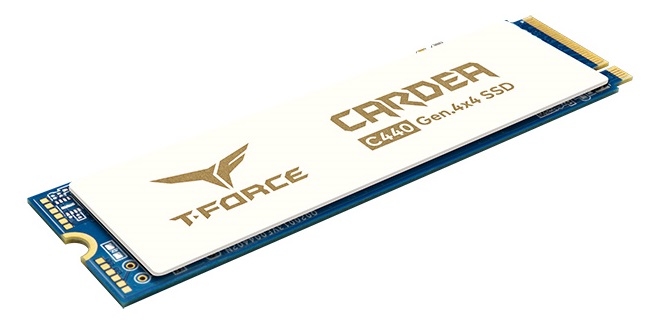Team Group Joins PCIe 4.0 Fray With Ceramic-Clad, White SSDs
Who's the prettiest SSD of them all?
It's not every day that we'll quote a product's marketing description, but this one cracked us up. Today, we saw the unveiling of the Team Group Cardea Ceramic C440 SSDs, which the vendor claims is "beautiful and thin as a snowflake." Of course, that's an exaggeration, but we can confirm the new drives are at least white like a snowflake, thanks to its ceramic heatspreader, and Team Group's latest contenders for best SSDs in the PCIe 4.0 M.2 SSD market.
Operating on the PCIe 4.0 interface, these SSDs should be no slouches. They can read and write at up to 5,000 and 4,400 MBps, respectively, and come in 1TB and 2TB capacities. Team Group's clearly gunning for a high-capacity audience -- at least as far as most M.2 capacities are concerned.

Although Team Group didn't specify the controller its new drives use, given these speeds we reckon they're packing a Phison controller to enable the PCIe 4.0 support. There are hardly any alternatives on the market today.
Measuring 80mm long, the Cardea Ceramic C440 series will fit in most M.2 slots found in desktops. They're also only 4.75mm thick, making the "thin as a snowflake" comparison more understandable. For added beauty, the drives feature an "Aerospace" ceramic heatspreader. This is supposed to improve heat dissipation by dissipating more watts and helps with the drives' lightweight build while fighting off electromagnetic interference.
Team Group Cardea Ceramic C440 Specs
| Header Cell - Column 0 | C440 1 TB | C440 2TB |
|---|---|---|
| Interface | PCIe Gen4 x4 | PCIe Gen4 x4 |
| Max Read Speed | 5,000 MBps | 5,000 MBps |
| Max Write Speed | 4,400 MBps | 4,400 MBps |
| Max Read / Write IOPS | 750,000 / 750,000 | 750,000 / 750,000 |
| Durability | > 1,800TB written | > 3,600TB written |
| Warranty | 5 years | 5 years |
Team Group hasn't revealed pricing yet. But as the SSDs follow the same recipe as many competing PCIe 4.0 SSDs, we reckon they'll be priced accordingly at around $200 for the 1TB model and twice that for the 2TB flavor.
Get Tom's Hardware's best news and in-depth reviews, straight to your inbox.
Niels Broekhuijsen is a Contributing Writer for Tom's Hardware US. He reviews cases, water cooling and pc builds.
-
Olle P I'm a bit sceptic to that ceramic piece.Reply
In aerospace ceramics are usually used to insulate from heat (at very high temperatures) rather than transmitting it.
That said, some ceramics are heat conductive, but those are rare and expensive. -
King_V I'll have to admit that I was a bit curious about it myself. But I made the opposite assumption: that ceramics normally transmit heat, and that the aerospace stuff was the rare, insulating type.Reply
I made that assumption based on my very non-scientific "how many times have I burned my hand on a plate after heating something in a microwave a little too long?"
(the answer is: more times than I care to admit) -
0112358 Googling for "heat conductivity of ceramics" --> 1st hit:Reply
"Ceramics are increasingly used in packages and printed circuit boards, because they have a number of advantages over plastics: much higher thermal conductivity, possible match of the coefficient of thermal expansion, and hermetic sealing. Unfortunately, the cost of ceramics is still much higher than that of plastics, prohibiting their use in low-cost high-volume products. Nevertheless, their use in future products seems unavoidable, given the trends in the semiconductor industries regarding the expected much lower thermal resistances of the packages and the concurrent design of packages and boards to facilitate heat spreading. "
Dated: 1999. We're the future mentioned.
Ref: https://www.electronics-cooling.com/1999/09/the-thermal-conductivity-of-ceramics/ -
0112358 Definitely a "P.S.":Reply
"Samsung's 980 Pro M.2 SSDs are expected to feature read and write speeds of 6500 MB/s and 5000 MB/s, respectively, which is notably faster than the Phison-based SSDs that are on the market today. "
https://www.tomshardware.com/news/report-pcie-4.0-based-samsung-980-pro-ssd-will-have-max-capacity-of-1tb
